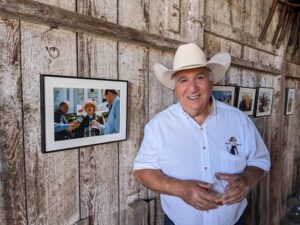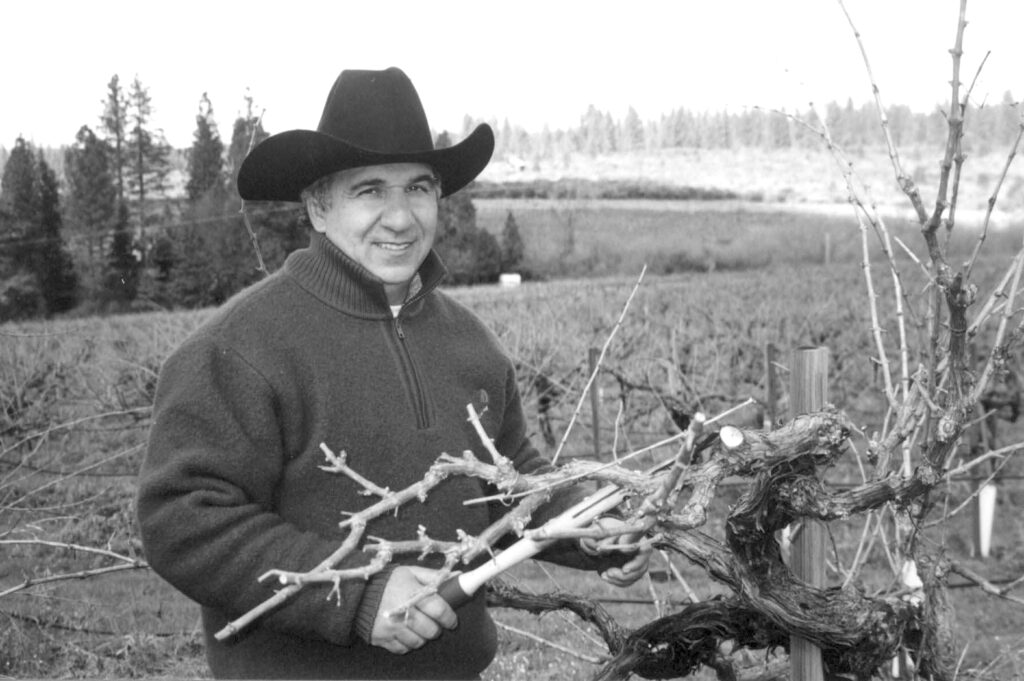
Phil LaRocca is the owner of LaRocca Vineyards. He is the Chair of the CCOF, Inc. Board and also serves on the CCOF Foundation Board.
“I have a firm belief about organic,” Phil says. “As a kid, I spent every weekend at my grandfather’s ranch in the Santa Clara Valley.” The whole family worked on the farm, picking cherries and helping with the harvest. Apricot season, when Phil was out of school, was his favorite. “I got the farming bug in me. I loved being out there with the trees.”
After World War II, federal officials tried to give Phil’s grandfather some excess chemical fertilizer left over from the war, but the Sicilian rancher came out waving a shotgun and “chased them off.” The farm remained a natural oasis even as synthetic fertilizers were widely adopted elsewhere.
Phil knew he wanted to be a farmer when he grew up. He’d watched his mother, an excellent cook, carefully choose fresh vegetables and scrub them at the sink, so he knew the importance of growing clean ingredients. In the late 1960s, he took a job tending an apple orchard and installed his own vegetable plot on an acre of the land. He graduated from San Jose State University and worked in agriculture, including teaching an organic farming class, working on a cattle ranch, and getting a master’s degree at California State University, Chico.
Working in agriculture wasn’t all peaches and cream, though. “I was working for this conventional grower; he was a good guy, but he sprayed all kinds of chemicals, like DDT before they banned it,” Phil says. “I told him, ‘I can’t do this, I feel really unhealthy.’ I eventually got to pick out my own orchard, and I was determined to go all organic—the first certified apple orchard in California.”
It took Phil two struggle-filled years to figure out how to successfully do things organically on his farm. He was an outlier at the time, and there wasn’t a lot of support for organic in the agricultural community. “People—even one professor at UC Davis—told me, ‘You dumb hippie, you’ll never grow apples organically!’” Nevertheless, Phil persisted and eventually grew a successful organic farm.
The term “organic” wasn’t well understood back then and didn’t always land on receptive ears, Phil says. “Some buyers would stop buying my apples when they found out I was organic. When they heard the word, everybody walked away from me.”
Still, he knew organic was the way to go. “At one conventional nut orchard in the Sierra Buttes, we watched a squirrel drink from the irrigation ditch, then it keeled over and died. Then we saw a rabbit do the same thing. After that, even though they said I could pick some if I wanted, I never touched nuts from that orchard again.”
Around 1975, he started to see more organic farms, and thought, “Oh! There are other like minds!” He joined a small grassroots organization called CCOF. In those days, before the U.S. government regulated organic certification, organic farmers had to certify each other. Phil liked what CCOF was doing, and eventually he was elected to be the board president. He currently serves as the chair. “I try to stay involved. I’ve donated a lot of time to this organization because I believe we have to be vigilant for the sake of integrity.”
As CCOF grew, Phil’s career evolved, and he became one of the early pioneers of organic wine grapes. In 1991, LaRocca Vineyards released its first organic wine. Phil is proud of the honest way he’s farmed. “My kids could run through my orchard, and if a grape fell on the ground, they could eat it right off the ground. I had no contaminants on my soil.” A second generation of LaRoccas now runs the family vineyard.
Phil is quick to point out that organic agriculture takes hard work. “There are a lot of challenges and you can’t give up. You have to be 100 percent convinced that you’re doing the right thing.” The result is worth it, though. “Every time there’s acreage that’s glyphosate free, it’s a win for humanity and the world.”
